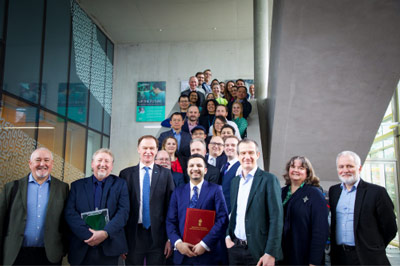News: Microelectronics
8 February 2024
UK’s £11m REWIRE Innovation and Knowledge Centre to develop wide/ultrawide-bandgap high-voltage power electronics
With funding of £11m from the UK Engineering and Physical Sciences Research Council (EPSRC) and Innovate UK (both part of UK Research and Innovation), the new Innovation and Knowledge Centre (IKC) REWIRE is being led by professor Martin Kuball and his team at the University of Bristol, with support from partners at the Universities of Cambridge and Warwick, as well as industry partners including Ampaire, BMW, Bosch, Cambridge GaN Devices (CGD), Element-Six Technologies, General Electric, Hitachi Energy, IQE, Oxford Instruments, Siemens, ST Microelectronics and Toshiba.
The IKC aims to accelerate the UK’s progress towards net-zero by transforming the next generation of high-voltage power electronics devices using wide/ultrawide-bandgap (WBG/UWBG) compound semiconductors, as well as enhancing the security of the UK’s semiconductor supply chain.
Compound semiconductor WBG/UWBG devices have been recognized in the UK National Semiconductor Strategy as key elements to support the net-zero economy through the development of high-voltage and low-energy-loss power electronic technology as building blocks for developing all-electric trains, ships and heavy-goods electric vehicles, better charging infrastructure, renewable energy and high-voltage direct-current grid connections, as well as intelligent power distribution and energy supplies to telecom networks and data centers.
“The REWIRE IKC will focus on power conversion of wind energy, electric vehicles, smart grids, high-temperature applications, device and packaging, and improving the efficiency of semiconductor device manufacture,” notes Bristol IKC lead Kuball.
 Picture: Professor Martin Kuball (front, third from right) at the launch event for the IKC.
Picture: Professor Martin Kuball (front, third from right) at the launch event for the IKC.
“The REWIRE IKC will play a prominent role within the UK’s semiconductor strategy in cementing the UK’s place as a leader in compound semiconductor research and development, developing IP to be exploited here in the UK, rebuilding the UK semiconductor supply chain, and training the next generation of semiconductor materials scientists and engineers,” says professor Peter Gammon, head of research and deputy head of school, School of Engineering, University of Warwick.
Bristol is one of two new IKCs being funded by the EPSRC and Innovate UK. The second IKC at the University of Southampton aims to improve development and commercialization of silicon photonics technologies in the UK.
“This investment marks a crucial step in advancing our ambitions for the semiconductor industry, with these centers helping bring new technologies to market in areas like net zero and AI, rooting them right here in the UK,” says Saqib Bhatti, UK Minister for Tech and the Digital Economy.
The University of Bristol team specializing in semiconductors was also recently awarded £5m from the EPSRC to develop the next generation of aluminium gallium nitride (AlGaN) solid-state circuit breakers. It is anticipated that these will greatly improve efficiency and voltage range, potentially enabling global energy savings of up to 20% compared with continuing with existing technologies.
UK unveils National Semiconductor Strategy, with £1bn government funding








